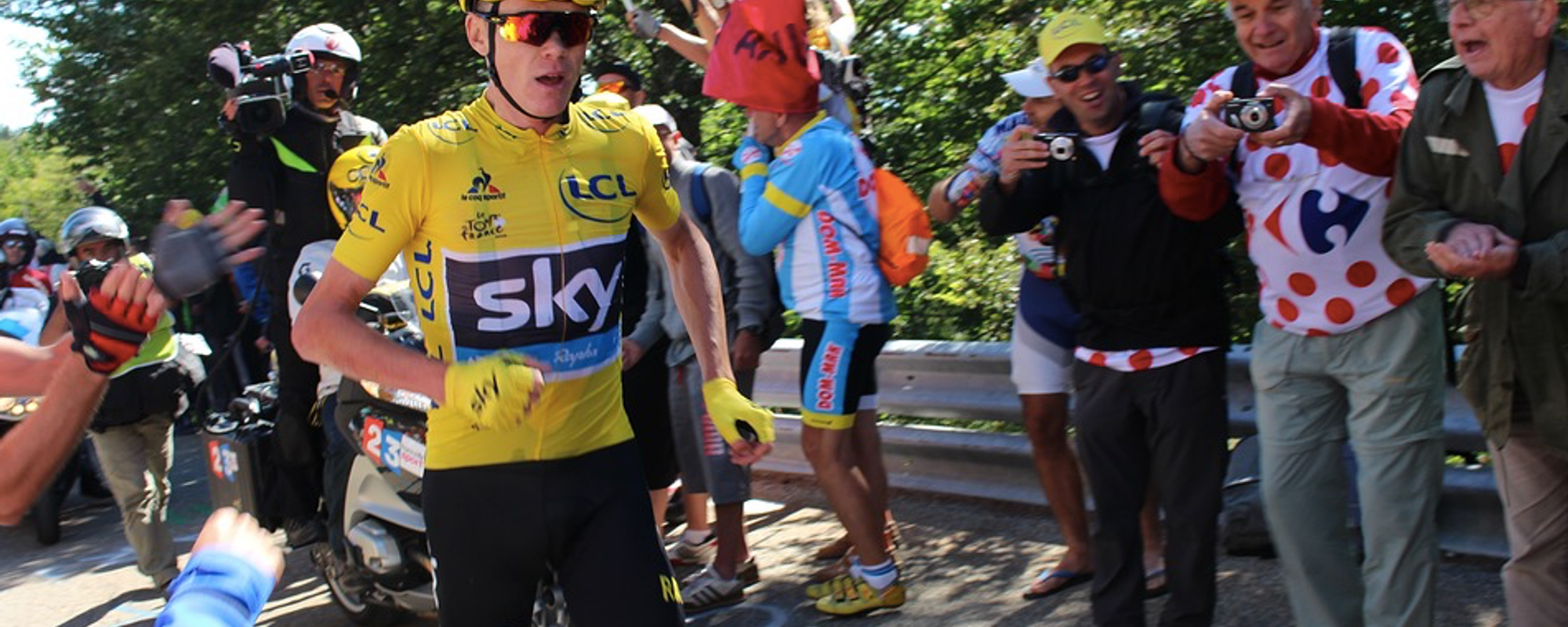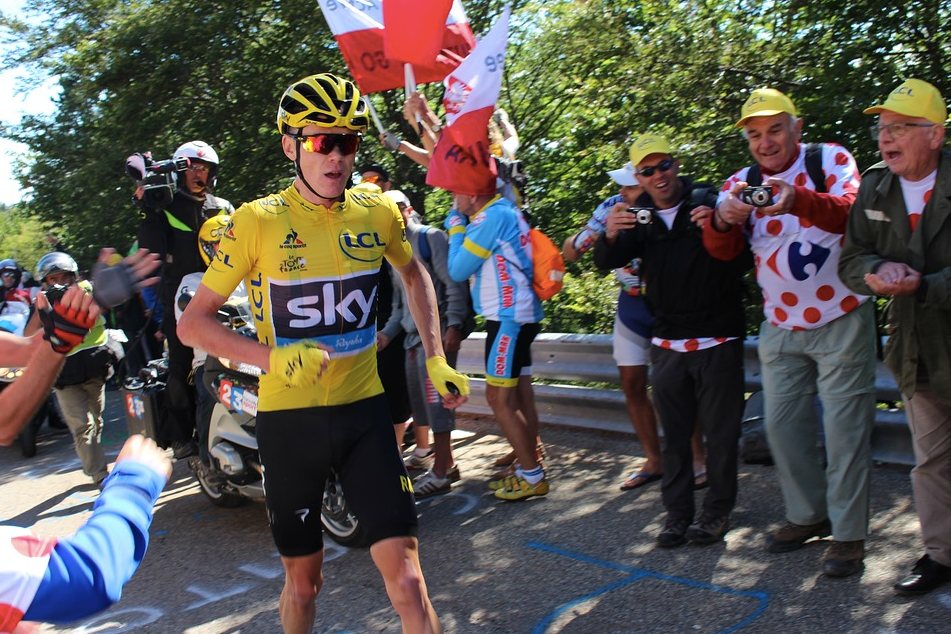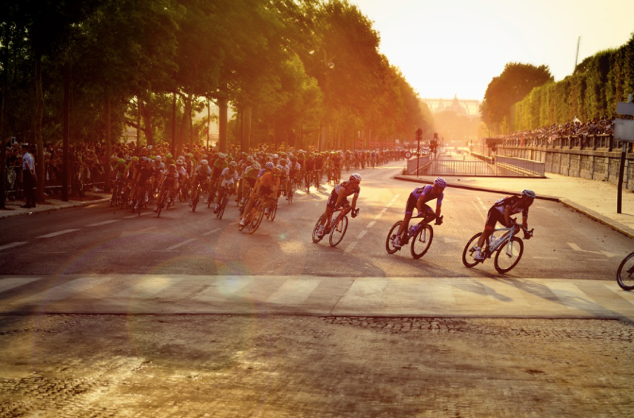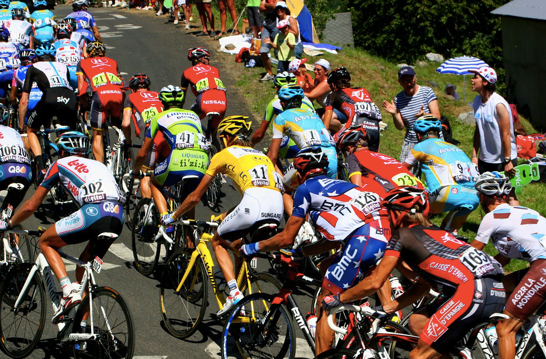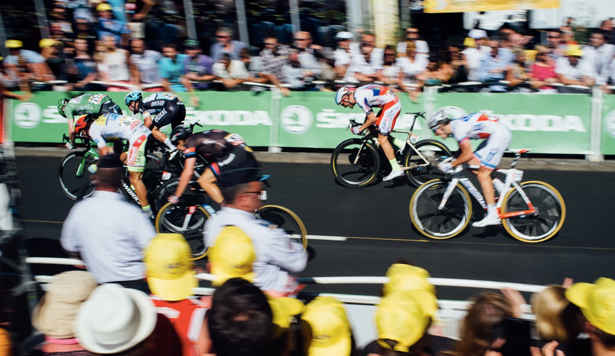Don’t know anything about cycling or the Tour de France?
Perhaps this blog can help you. The Tour de France is a tour on a bicycle through France of about three weeks, whereby 176 professional cyclists start each morning for a different stage, which can take anything from 40 minutes to six hours.
Chris Froome, Source: maxpixel.net
The Tour has started on the 7 th of July and will finish on the 29 th of July; the Tour always finishes in Paris. The cyclists are part of a team, there are 22 teams participating, so that means 8 riders per team. Each team is sponsored by several key sponsors, and the teams are named after their sponsors, as their main aim is to get their sponsor name known to the public. Sometimes this can lead to a team name like “EF Education First – Drapac presented by Cannondale”, quite a mouthful. With a change of sponsor, the teams will also change their names (and jerseys!), so it is sometimes hard to recognize the teams. Cyclists generally stay with one team for one or more seasons; at the end of the season they can change teams. The budget of a professional team on an annual basis is between 5 to 20 million Euros.
The 22 teams are from a range of countries: UK, Netherlands, France, Belgium, Spain, Italy, Germany, Kazakhstan, Bahrain, USA, South Africa, Switzerland, Australia and UAE.
There are different types of stages:
Flat stages: where generally a few escapees are reeled in a few kilometres from the finish, and a sprint will determine who wins, there are 9 of these stages in this Tour.
Mountain stages: these are generally the most exciting to watch, especially the stages where the finish is uphill as the general classification is for a large part determined during these stages, this year there are 10 mountain stages.
Team Time Trial: The teams will ride together, starting a certain period apart, and the teams will have to finish with at least four riders, there is one Team Time Trial in this year’s Tour.
Individual Time Trial: Here riders start in reverse order of the general classification, 30 seconds or 1 minute apart, the fastest time counts, there is one individual time trial in the Tour (other years there were two).
Source: pixabay.com
Who wins the race?
There are a few ways you can ‘win’:
The overall winner on time is the one that finishes all the stages in the least amount of time. This classification is calculated at the end of every day, and the leader of this gets to wear a yellow jersey. Even though there is only one person that wins the race, he will share the prizes he wins with his team, as he needs his team members to assist him to win the race. Some of the team members carry water and food for the other members, shelter their most important rider from the wind, shelter their rider if there is a lot of pushing and shoving, wait if he gets a flat tire or give him their bike, and pace him up some of the climbs. There is also a classification for the fastest team on time, where by the time of the first three members of each team are added.
*source: pixabay.com
The one who wins the stage on the day is the stage winner; in the flat stages this is often somebody that can sprint very well. Some teams do not have a rider for the general classification, but only for the sprints.
In addition to the stage win, which will win you points, there are often extra bonus sprints during a stage. The one that collects most points over all the past stages gets to wear the green jersey.
On the top of every big mountain, there are ‘mountain points’ to win; the one with most mountain points over the past stages gets to wear the polka dot jersey, this is considered to be the best climber.
The white jersey is for the one with the least amount of time and is less than 25 years of age.
Ready to Blog & Earn?
With TravelFeed, easily start your own travel blog and earn as you go. It's the smart platform for travelers who want to profit from their passion. Create a free account
The most combative rider is honoured at the end of every stage; often this is somebody that has been in a breakaway the whole day but was caught by the peloton a few kilometres before the finish. The peloton is very good these days in calculating their speed so that they will catch the breakaway a few kilometres before the finish.
A sprint finish, source: unsplash.com
How much do they win?
The first prize is around 450 thousand Euro, and a stage winner wins around Euro 8,000. This money will have to be shared amongst all the team members.
The cyclists have created their own terminology over the years, with a few foreign words thrown in for good measure, often French words. The ‘bus’ or ‘grupetto’ is the group of non-climbers that try to stay together during a climbing stage to make sure they finish within the time limit. A 'bidon' is a water bottle, a ‘Broom wagon’ is a vehicle that rides behind the last rider to collect anybody unable to continue, a ‘domestique’ is a cyclist that has to assist his captain of the team, and a ‘Flamme rouge’ is the red flag displayed one kilometre before the finish to indicate that the finish is near. A ‘soigneur’ (French for carer), is a team member that is not riding and who supports the riders with food, post-ride massages and other health issues.
How to riders manage to cycle for three weeks, doing a few thousand kilometres?
They do train a lot, they sometimes sit in the saddle for over 40 hours a week during a training period. They rest as much as possible, and eat a lot.
Don't Forget: Get Travel Health Insurance!
To make your trip a worry-free experience, TravelFeed recommends SafetyWing Nomad Insurance. It provides comprehensive health coverage while you travel, so you can focus on exploring, not the unexpected. Get a quote here
How do riders go to the toilet?
They often wait for a moment when the speed is not too high and stop along the road. When this is not possible, they also go to the toilet while riding, sometimes while being pushed by their team mates.
And what’s with that first picture of this blog, Froome doesn’t seem to have a bike?
Well yes, he needed another bike, but his spare bike took some time, so he decided to go running not to lose too much time….
Chris Froome running, Source: maxpixel.net
And who will win this year’s Tour de France?
Well that’s of course the question. There are a few riders like Chris Froome and Tom Dumoulin (my favourite 😉) that are riding both the Tour de France and the Giro d’Italia, which is also a three-week stage race in, you guessed it, Italy. It is thought that it is very difficult to win two of these races in short succession (Froome came first in the Giro, Dumoulin 2nd), so we have to wait and see how they will do after three weeks.
@Ultrabiker
Travel Resources
Recommended by TravelFeed
Flights: We recommend checking Kiwi.com to find the best and cheapest flights .
Accomodation: Find great stays on Booking.com, Agoda and Hostelworld.
Travel Insurance: Medical emergencies abroad can be pricey, but travel health insurance is not. We always use SafetyWing for affordable and reliable coverage.
Car Rental: For hassle-free car hiring, DiscoverCars is our trusted choice with a wide selection of vehicles.
Internet: Got an eSIM compatible phone? Airalo is perfect for reliable internet access during your trip. Just install it before you go, and you're set!
Day Trips & Tours: We recommend GetYourGuide for a variety of well-organized and enjoyable activities.
Travel Planner: Need a hand planning? Our free travel planner chatbot is your personal guide. Chat now.
Disclosure: Posts on TravelFeed may contain affiliate links. See affiliate disclosure.
